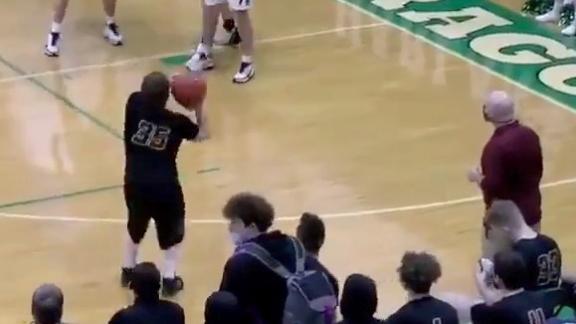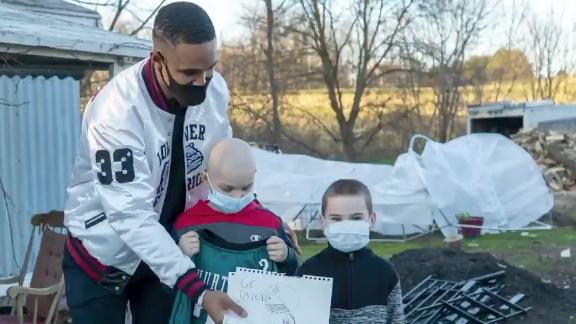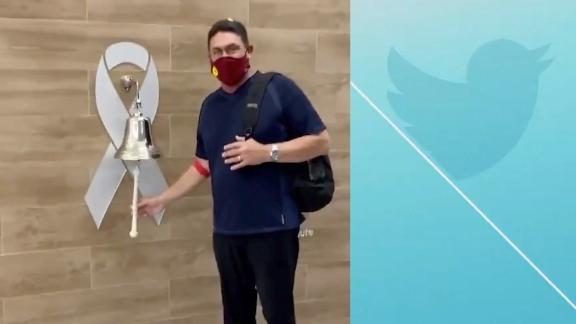You may have seen Michael Spencer at the base of a halfpipe. Or maybe you've heard him. One of freeskiing's original agents, Spencer is often the guy screaming his skiers' names as they drop in, while clapping his hands thunderously in the middle of the spectators corral. It's easy to mistake the wavy-maned 41-year-old for an overzealous parent or uncle, but the truth is few carry as much knowledge or behind-the-scenes influence in freeskiing. Not only does Spencer represent some of the sport's elite competitors -- including the top three men in the overall world rankings this year, Gus Kenworthy, Torin Yater-Wallace and Jossi Wells -- but he's also one of four co-founders of the Association of Freeskiing Professionals.
Spencer's clients outside of freeskiing include three-time Olympic triathlete Hunter Kemper, Olympic ski cross gold medalist Ashleigh McIvor and motocross star Josh Grant. He also represented the late Sarah Burke. Shortly after Burke's death in January, Spencer was named director of action and Olympic sports at Wasserman Media Group, a big move for the Park City, Utah, native and Pepperdine Law School graduate. Before heading off to represent the AFP at the International Ski Federation's Congress in South Korea, which is taking place this week, Spencer spoke to us about all things freeskiing and Olympics.
You have a lively style at the base of the pipe. How would you describe your mindset when one of your athletes is dropping in?
I get really nervous and anxious. For some of them, I'm almost like a parent or a brother. Part of being boisterous is a way for me to get rid of my nervous energy. Who doesn't like their name being screamed in the lights and getting all pumped up? There's one or two who are like, "You don't have to be so loud," but a lot of my athletes like it. There are other athletes who I don't represent who say, "Yell for me too!"
How'd you get into being an agent?
It was a weird twist of events. I'd quit skiing moguls competitively and didn't really know what I wanted to do. I decided to go to law school, got married while I was there, and ended up coming back to Park City after that. Mainly because of my wife -- she was an Olympic gold medalist in freestyle aerials [1998 champion Nikki Stone]. I got a job with the Salt Lake Organizing Committee in their legal department. They started asking me to help them read contracts, and all of a sudden I was like, maybe I should turn this into a career. Once I put the sign on the door saying I was an agent, I went looking for athletes who needed help going into the 2002 Olympics. I ended up with a couple medalists [skeleton champion Tristan Gale and moguls runner-up Shannon Bahrke] and it took off from there.
How did that lead you to freeskiing?
Snowboarding had obviously taken off. There were quite a few agents in snowboarding, but there was no one in freeskiing. I went to the World Superpipe Championships here in Park City, and I'd been hearing about this 15-year-old kid who was pretty good. I saw him ski and was like, holy cow. He was having a tough time making it through the entire pipe because he was so small, but his first two hits, you could just tell: If this kid could keep up his speed, he'd be incredible. So I went up and introduced myself. I ended up talking to his parents, and sure enough, four months later, I signed Simon Dumont as my first freeski client.
You handled a lot in the wake of Sarah's passing. How do you look back on that period now?
It was the most life-altering experience I've ever gone through. Having two children of my own made me become super close to Sarah's family. I still talk to them regularly; I got an e-mail from Sarah's mom today. They've become a very big part of my life. It's still hard when I really sit here and think about what we all went through. I would do anything for it never to have happened and for all of us just to be on the same path we were on Jan. 9, going about our daily business. But because of it, I also have a new family in her family. I've gotten to know people in ways I never thought I would. And that's how we're going to live, knowing that Sarah's watching over us: just be together and be each other's support group. [Long pause] But it's still very ... just different. Hard.
What's the biggest challenge of navigating freeskiing's new Olympic status from an agent's perspective?
It's understanding the Olympic movement. It's a lot different than just going to X Games. There are a lot more rules and regulations you have to follow, otherwise you could jeopardize your athletes' Olympic dreams. You need to be on your game, there's no question. You also need to know what the companies' marketing strategies are. Just because they're an Olympic sponsor, doesn't mean freeskiing's going to work for them.




